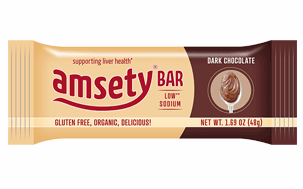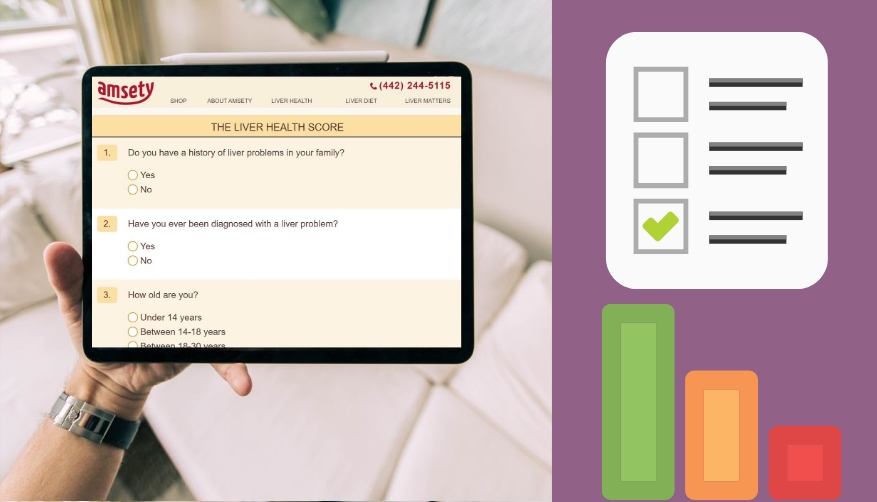A balanced diet centers around foods high in vitamins, minerals and other nutrients, and low in unnecessary fats and sugars. Eating a balanced diet helps to prevent health conditions and diseases, like Diabetes and Liver Diseases. Read our article to learn how to eat a balanced diet and the health benefits of doing so.
Daily calorie intake varies from person to person and depends on factors like age, gender, height, weight and fitness level. The United States Department of Agriculture’s (USDA) guidelines provide a helpful estimate of how many calories you should consume daily:

Discover the first nutrition bars designed to support liver health.
Read more >A balanced diet gives your body the nutrients needed for optimum health from consuming the following foods in moderation: lean proteins, legumes, whole grains, vegetables, and fruits. Dairy products are a good source of calcium and Vitamin D, however, they also contain a lot of fat, so it’s beneficial to consider dairy alternatives like almond or flaxseed milk. It’s important to avoid empty calorie foods that provide no or very little nutritional value, like butter, shortening, bacon, cheese and sports drinks. Consuming these foods often can cause health conditions and diseases, like cancer, high cholesterol, and fatty liver disease.
Protein is crucial for muscle and brain development. Healthy proteins include: beans, tofu, almonds, fish, and chicken. When eating meat, it’s important to know about where it comes from and how it’s raised. The health and diet of the animals you eat affects their fatty acid profiles and cholesterol levels. Grass-fed animals, as opposed to grain-fed animals, have improved fatty acid profiles and lower cholesterol. According to Harvard Medical School, the Recommended Dietary Allowance (RDA)for protein is 0.8 grams of protein per kilogram of body weight. However, you should limit red meat intake to 70 grams per day. Try our Coconut Chicken, Hearty Chili, or Lentil Stuffed Peppers.
Dietary fiber helps with fat digestion, decreasing cholesterol levels, preventing liver problems, and reducing inflammation and oxidative stress (the shift in balance between oxidants and antioxidants) in your liver. The US Dietary Guidelines recommends adults to eat three to five ounce-equivalents of whole grains each day. Examples of ounce-equivalent servings include: ½ cup cooked brown rice, one-ounce uncooked whole grain pasta and one slice of whole wheat bread. Avoid white bread, white pasta and other foods made with white flour, as the outer shell of the grain, which contains the most nutrients, is removed during the refining process. Try Lentils Over Brown Rice and Quinoa ─ compared to other grains, quinoa contains twice as much fiber.
For a nutritious on-the-go snack packed with fiber, try Amsety bars Made from high-quality, vegetarian, kosher and 100% organic ingredients, the bars contain Super 16 Mix®, a nutrient-packed mix made from 16 plant-based vitamins and minerals beneficial for liver health. The product contains no gluten, refined sugars, lactose or GMOs, and has very low sodium. Consumers can choose from two delicious flavors: Peanut Butter Superstar and Dark Chocolate Champion.
Fruits and vegetables contain essential vitamins and minerals, like Vitamins A and C, folate, iron, magnesium and potassium. The former recommendation of eating five fruits and vegetables each day has faded out, and many experts now recommend eating double. However, eating more vegetables than fruits is healthier, as fruits are high in sugar, and even too much natural sugar is harmful to your health. MyPlate, a US food and nutrition service, recommends filling half of your plate with colorful fruits and vegetables at each meal. Try Corn, Avocado & Tomato Salad, Garlic Haricot Vert or Fruity Kebabs.
Cardiac Diet for a Healthy Liver
How To Improve Your Liver Health
Liver Health and a Diabetic Diet
What´s your Liver Health Score?
Find out whether you are leading a livery-health lifestyle

Related Subjects
Back to top